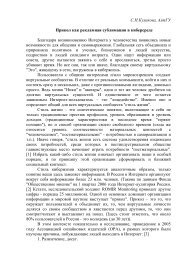Erasmus Mundus Action 1 Compendium 2009 - EACEA - Europa
Erasmus Mundus Action 1 Compendium 2009 - EACEA - Europa
Erasmus Mundus Action 1 Compendium 2009 - EACEA - Europa
You also want an ePaper? Increase the reach of your titles
YUMPU automatically turns print PDFs into web optimized ePapers that Google loves.
<strong>Erasmus</strong> <strong>Mundus</strong> Masters Courses<br />
Duration: 2 years<br />
CSSM<br />
Complex Systems Science<br />
Course description:<br />
A “complex system” comprises many interacting components leading to multiple levels of collective<br />
structure and organization. Examples include natural systems ranging from bio-molecules and living<br />
cells to human social systems and the ecosphere, as well as sophisticated artificial systems such as<br />
the Internet, power grid or any large-scale distributed software system. It is a key challenge for our<br />
society to better understand, adapt, design and control such systems.<br />
Our Masters degree teaches the tools to analyse complex systems and to understand their emergent<br />
behaviour. Students are offered a variety of research project opportunities to develop experience<br />
applying this to fresh challenges from the real world and within academic research.<br />
We offer an exceptional cross-disciplinary environment and experience, with the programme based<br />
around three leading research centres in Complex Systems, associated with the Universities of<br />
Warwick (UK), Ecole Polytechnique (de Paris, France), and Chalmers/Gothenberg (Sweden). The<br />
European Complex Systems Society is an associated partner<br />
The programme runs over two years (120 ECTS); it is half taught and half by research and leads to a<br />
JOINT Masters degree of University of Warwick, Ecole Polytechnique, Chalmers University<br />
(Gothenberg) and the University of Gothenberg. Students will be required to spend extended time in<br />
at least two centres and to join in events/collaborations across all three. Admissions are centralised<br />
(students must apply through Warwick, the Co-ordinating node) and successful candidates will start in<br />
September at the Centre whose initial teaching provides the best bridge between their undergraduate<br />
background and the programme as a whole. All students will have mobility opportunities after six<br />
months, and earlier for some well prepared students.<br />
Instruction will generally be available in English, in which all students will be required to have some<br />
competance. Local language support will be available at the respective nodes to help students<br />
integrate. Each Centre has staff speaking a wide range of European languages and will allocate each<br />
student a mentor with some language in common.<br />
Website: www.warwick.ac.uk/go/emmcs<br />
Partners:<br />
UNIVERSITY OF WARWICK, United Kingdom (Co-ordinating institution)<br />
ECOLE POLYTECHNIQUE, France<br />
CHALMERS UNIVERSITY OF TECHNOLOGY, Sweden<br />
UNIVERSITY OF GOTHENBURG, Sweden<br />
Contact:<br />
Robin Ball<br />
CENTRE FOR COMPLEXITY SCIENCE<br />
University of Warwick<br />
CV4 7AL COVENTRY - United Kingdom<br />
r.c.ball@warwick.ac.uk<br />
28






